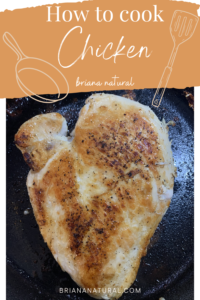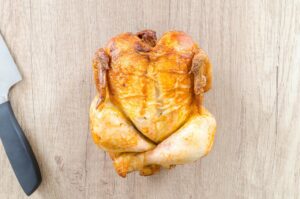Have you ever followed a chicken recipe only to wind up with something that looks like it came out of a horror story? We’ve all been there when it comes to learning how to cook chicken. You see a nice juicy chicken breast in a photo followed by a relatively simple recipe. Just follow the steps and that beautiful meal will be on your table shortly. Easy, right?
Wrong! Unfortunately, there are a few things you need to do in order to get your favorite chicken recipe to work for you. In my younger years when I was learning how to cook for myself, there were MANY steps that I missed.
“The recipe called for a 30-minute bake time, why is the center still raw?”
“Why is one part of the chicken overcooked and one side undercooked?”
“Why is my chicken watery?”
I’d ask myself all of these questions and it seemed like I just couldn’t get it right. It was frustrating and sometimes just embarrassing! Here are a few tips to help on your journey to chicken mastery that I’ve learned along the way.
- Pass on the frozen chicken. I’ve never been a fan of pre-frozen meat as you can always taste the difference. Meat that has been frozen will taste tougher and more dry. Avoid it if you can!
- Never cook your chicken fresh out of the fridge. When you cook cold chicken, the outside will cook before the inside has a chance to heat through. This causes an overcooked exterior with an undercooked interior.
- Always brine your chicken! Chicken breasts contain a lot of water fresh out of the package which needs to be removed. You can do this either by salting your chicken with kosher salt (I find the thicker Kosher salt does a better job than table salt) or letting your chicken sit in lukewarm saltwater for 15 minutes. Trust me, it makes a HUGE difference in taste.
- If you choose to go the baking route, use an oil with a high smoke point that can withstand the heat without burning. Some good oils would be refined olive oil (extra virgin has a lower smoke point which can burn), avocado oil, coconut oil, canola oil or peanut oil. Oils are especially good for baking as they help prevent the chicken from drying out.
- When cooking chicken, make sure to give each piece enough room in the pan. Overcrowding the pan can make chicken steam instead of sear. If that happens, you won’t get that crispy texture you’re looking for.
- Use a meat thermometer. While most recipes will give you a cooking time, they don’t always tell you the internal temperature your chicken should reach. Use a meat thermometer to check that it has reached an internal temperature of 165 F to ensure that your chicken is cooked through.
- Keep the size of your chicken in mind, especially with chicken breasts. We’ve all bought a pack of chicken breast before. Ever notice how some of them are drastically different in size? Keep that in mind when cooking and use your best judgement! If you have one breast that is significantly larger than the other, try to account for that when cooking. You can either take the smaller one off of the pan sooner or pound the larger breast down to a thinner size.
- For extra large chicken breasts, pound it with a meat mallet! If it is of uneven thickness, the thinner part will become overcooked and hard. I sometimes will cut the end off if it’s too thin and pound the thickest parts down.
- Bone-in chicken will take longer to cook than boneless. Keep this in mind when you come across some chicken thigh recipes that look mouthwatering! The method and time it takes to cook are drastically different between the two as bones are poor conductors of heat. This results in a longer cooking time. However, bones add flavor to the meat and I would choose this over boneless any day of the week!
- Remove from heat immediately when finished cooking. If you simply turn the stovetop off, it is still sitting in a hot pan. I prefer to place the chicken on a plate and tent with foil to lock in those juices. Let it rest for about 10 minutes before cutting.
In conclusion, cooking chicken can be a straightforward process, but you need to pay attention to the little details. Doing so will take your dish from good to great! From patting your chicken dry to trying out different cooking methods, these tips should help you cook like a pro. Happy cooking!


